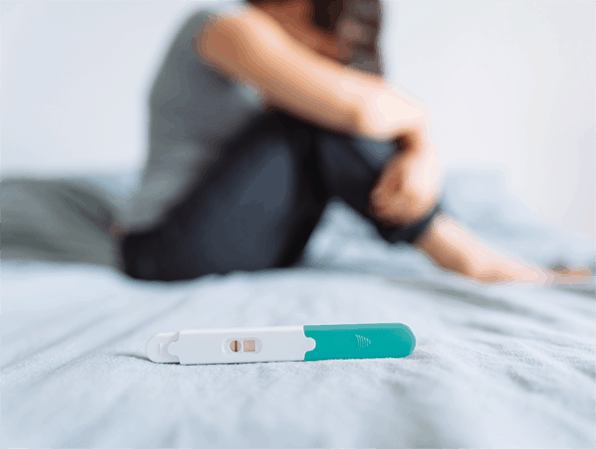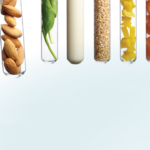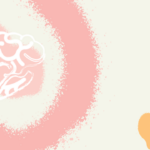In my naturopathic practice, I see women every day who feel defeated, frustrated, and even embarrassed by their “unexplained infertility.” Many women wonder what they should do: desperately seek invasive treatments, or simply keep trying naturally.
Fertility problems and infertility may be more common than you think.
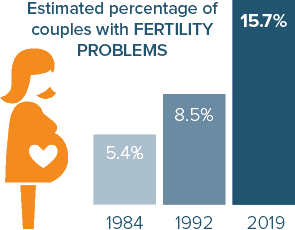
The overall number of people facing fertility problems has increased over the years. In 1984, the estimated percentage of couples with fertility problems was 5.4%. In 1992, this number increased to 8.5%. And today, the estimated prevalence (total number of couples with infertility) is a staggering 15.7%.
Among couples with a female partner aged 40–44 years old, the infertility rate is 14.3% to 20.7%. Thirty years ago, in 1984, that number was only 4.6%.
Research shows that as a woman’s age increases the rate of infertility decreases, but the trend of rising infertility rates is no longer exclusive to older women. In 1984, the infertility rate of couples with a female partner aged 18–29 years was 4.9%.
Fast forward to 2019 and the infertility rate in this age group is 7–13.7%.. A report from the National Center for Health Statistics found that the fertility rate for the U.S. in 2017 has continued to dip below what’s needed for the population to replace itself! The rate in 2017 was 1,765.5 per 1,000 women – 16% below what is necessary for population replacement. About 3.8 million babies were born in the U.S. in 2018, and this number represents the lowest number of births in 30 years.
No one knows for sure what is causing the severe decline, but it is clear that some of the factors that plague our modern world are partly to blame. For example, stress hormones and toxic chemicals that act as hormone disruptors (such as insecticides, flame retardants, and phthalates from lastics) affect the hormones responsible for sperm production. Also, excessive oxidative stress can cause damage to vulnerable reproductive organs, and can hurt both sperm, egg quality, and production.
There are many reasons women today struggle with their fertility, and while sometimes it can feel like there is no explanation for it, it’s merely undiagnosed. In some cases, infertility may have a single cause in one partner, or it could be a network of predisposing factors.
As a naturopathic doctor, I believe in treating my patients holistically. I try to find the underlying cause of infertility, and there are many tests to identify the catalyst of infertility.
Here are some common causes of infertility:
Autoimmune infertility – Endometriosis
Diseases such as lupus, autoimmune thyroiditis, and diabetes can be associated with decreased fertility. Other causes of infertility such as premature ovarian failure, endometriosis, and polycystic ovarian syndrome (PCOS) include autoimmune factors. Many unexplained cases of infertility contain inflammatory processes that can be directed against hormones and reproductive tissues such as the ovaries and testes.
ENDOMETRIOSIS is a condition that causes painful periods, cramping leading to menstruation, heavy flow, and painful intercourse, and is also one of the most common causes of infertility among women. Unfortunately, endometriosis cannot be tested via blood work or ultrasound; therefore it isn’t often accounted for in a preliminary fertility testing. Endometriosis can only be diagnosed through laparoscopic surgery.
There are many natural ways to relieve pelvic inflammation, such as:
› Cleaning up the home and diet from environmental toxins and hormone disruptors that could contribute to creating endometriosis – buy organic, switch over to cleaner beauty and household products as well as get rid of plastics, especially the containers you use to store food!
› Hormone-supportive formulas such as WomenSense® EstroSense® to help support healthy hormone balance and pollutants.
Stress
Stress affects each system in the body, especially the ability for women to reproduce. Stress affects ovulation response, progesterone levels, thyroid function, and amplifies any other health issues that are present. Studies indicate that ovulation and sperm production may be affected negatively by mental and emotional stress. I encourage my patients to incorporate stress management techniques into their lifestyles, such as meditation, acupuncture or massage, and also include stress-supportive nutrients such as B vitamins, magnesium, and adaptogenic herbal formulas such as WomenSense® AdrenaSense®.
Weak Immune System
Many conditions can affect the immune system which in turn affects fertility. Some common conditions that upset immunity include allergies, asthma, eczema, and autoimmune conditions such as thyroid disorders, celiac disease, Crohn’s disease, or colitis. Making dietary changes is a great way to support the immune system and decrease inflammation. Here are a few immune-boosting foods to include in your diet:
• Citrus fruits
• Garlic
• Ginger
• Turmeric
• Almonds
• Spinach
• Broccoli
Sperm Quality and Mobility
In men at least one testicle must be functioning correctly, and there must be adequate testosterone and other hormones to trigger and maintain sperm production. Sperm production is also affected when one (or both) testicle fails to descend from the abdomen into the scrotum during fetal development. Abnormal semen causes about 75% of all cases of male infertility, and often, the reason is unknown.
There could also be a problem with low-sperm mobility (motility) or more commonly, “slow swimmers.” Sperm concentration should be 20 million sperm per milliliter of semen. If the count is under 10 million, this is considered a low-sperm concentration. Low-sperm counts or motility problems can be due to multiple causes, including cell phones, which may reduce sperm quality through exposure to radio frequency (RF)electromagnetic radiation (EMR). Men carry cell phones in the jean pockets or coat pockets.
Nutritional supplementation for sperm quality include: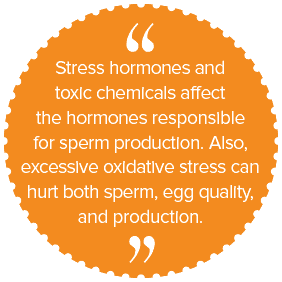
• Zinc picolinate
• L-carnitine
• Vitamin C
• N-acetyl-L-cysteine (NAC)
• Stress support such as AdrenaSense
• Vitamin D
• Maca
Quality of a Woman’s Eggs
As women age, so do their eggs (and often eggs can age prematurely). However, older women’s fertility assessments can be less thorough as there s often an assumption that age is the sole factor that affects fertility. If hormonal tests are normal, consider an ovarian reserve test called the anti-mullerian hormone (AMH) test, and include a few supplements into your diet that help support egg quality:
• Coenzyme Q10 may help boost the function and quality of eggs
• Vitamin D
• Rhodiola
• N-acetyl-L-cysteine (NAC)
Thyroid Function
Many women suffer from undiagnosed thyroid disorders. It is crucial to optimize thyroid function to support fertility and sustain the pregnancy, so women should make it a priority to get their thyroid tested. Some common signs of low thyroid include difficulty losing weight, long menstrual cycles, or feeling cold easily.
WOMENSENSE® THYROSENSE® contains the ingredients that support the symptoms of low thyroid by maintaining healthy levels of both thyroid hormones T4 and T3.
Low Progesterone Levels
Low progesterone levels Progesterone levels are often missed, and many women suffer from low progesterone levels. Many herbs can support progesterone, such as:
CHASTEBERRY (Vitex agnus castus) is a progesterone agonist, which can help minimize the risk of miscarriage. Although it does not contain progesterone, it affects the pituitary gland in such a way it regulates the secretion of progesterone from the ovaries, thereby stimulating ovulation.
VITEX is also helpful in correcting hormone deficiency of either estrogen or progesterone and in PCOS-related infertility.
Weight
Underweight and overweight women often struggle with infertility; underweight women, or women who overexercise, can have low estrogen levels or irregular ovulation. Overweight women may have hormone imbalance issues, such as PCOS or inflammation.
Polycystic Ovarian Syndrome (PCOS)
PCOS is an endocrine disorder that causes the ovaries to produce higher than normal amounts of androgens (male hormones) which can interfere with egg production and lead to irregular hormone levels, disrupted ovulation, and difficulty carrying a baby to full term. It’s important to rule out PCOS when getting to the root cause of your infertility struggles.
Here are a few supplements I recommend to help with PCOS:
SAW PALMETTO Saw palmetto inhibits activity of the enzyme 5-alpha-reductase, thus reducing the conversion of testosterone to dihydrotestosterone (DHT), which can be elevated in women with PCOS. This action also helps reduce acne, excess facial and body hair, as well as hair loss from the scalp.
WOMENSENSE® VITEX CHASTEBERRY can be used to support menstrual regularity and help support fertility. Vitex is thought to exert hormonal activity through action on the pituitary gland, specifically on the production of luteinizing hormone (LH). LH stimulates progesterone release after ovulation.
Planning for a family only to discover you are unable, or need medical intervention can be challenging and frustrating.
But remember there is always an underlying cause, I hope these suggestions help unlock the answer and guide you in
the right direction in your journey.

